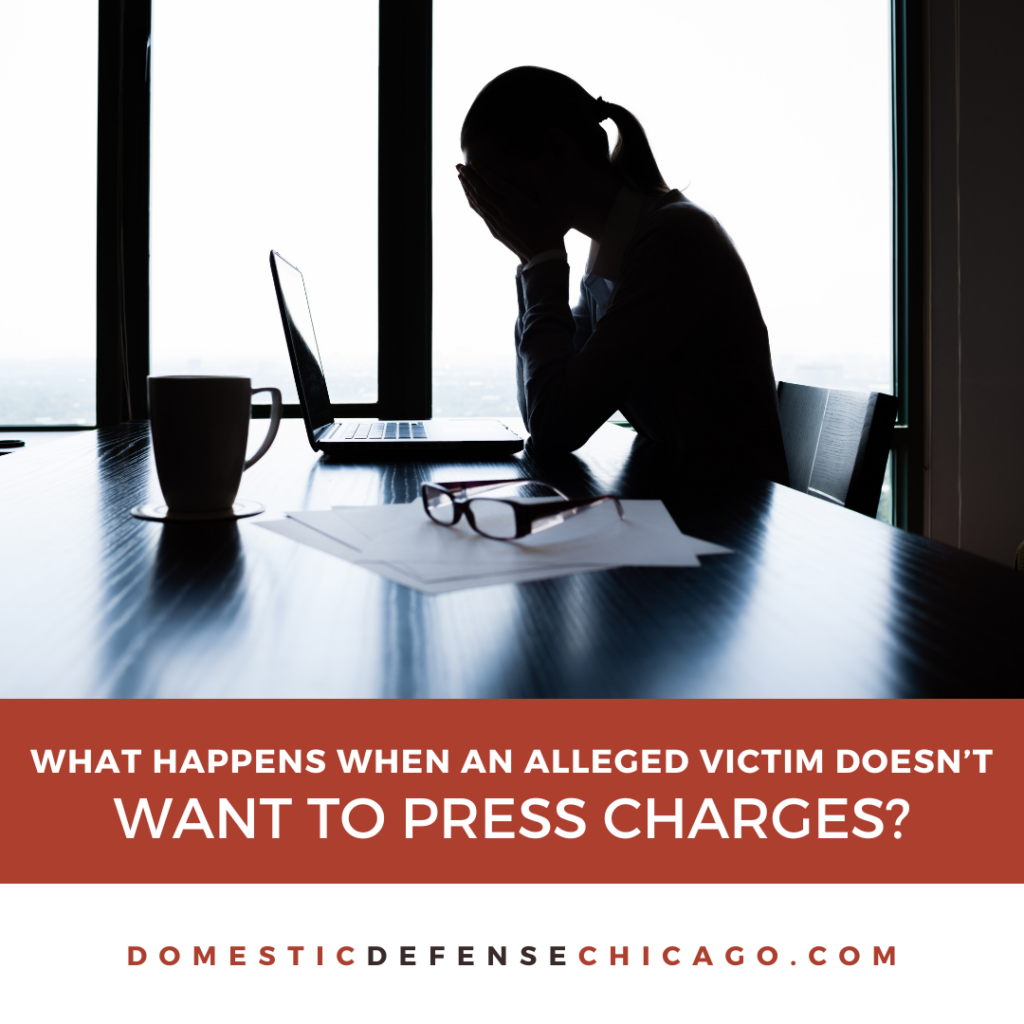In Illinois, domestic battery cases are taken very seriously, and the decision to proceed with charges doesn’t rest solely with the alleged victim. If you’re facing charges and the alleged victim doesn’t want to press them, it’s essential to understand how the legal system works and what steps you can take to protect your rights. The prosecution—not the alleged victim—decides whether to pursue the case, and understanding this distinction is critical.
What Happens if an Alleged Victim Doesn’t Want to Press Charges?
This guide explains the following:
- The role of the prosecution in domestic battery cases
- Why the alleged victim’s wishes may not stop a case
- How prosecutors handle evidence in these situations
- The potential impact on your case
- The importance of working with a domestic battery defense lawyer
Here’s a closer look at each.
The Role of the Prosecution in Domestic Battery Cases
In Illinois, domestic battery cases are prosecuted by the state, not the alleged victim. Once law enforcement becomes involved and determines there is probable cause, the case is referred to the prosecutor’s office. Prosecutors evaluate the evidence and decide whether to file charges, regardless of whether the alleged victim wants to proceed.
This approach aims to protect victims from potential coercion or intimidation, ensuring that serious cases are not dismissed solely based on a victim’s statement. Even if the alleged victim refuses to cooperate, the prosecution can proceed if there is enough evidence to support the charges.
Why the Alleged Victim’s Wishes May Not Stop a Case
While the alleged victim’s input can be a factor in the prosecution’s decision, it is not the deciding factor. Illinois law prioritizes public safety and accountability in domestic violence cases. If prosecutors believe there is sufficient evidence to secure a conviction, they may move forward with the case to prevent further harm or establish accountability.
For example, if the police collected physical evidence, witness statements, or recorded calls that support the allegations, the case may proceed even if the alleged victim expresses a desire to drop the charges.
How Prosecutors Handle Evidence in These Situations
In cases where the alleged victim does not want to press charges, prosecutors rely heavily on other forms of evidence, such as:
- Police reports documenting injuries, property damage, or statements made at the scene
- Photographs or videos taken during the investigation
- Medical records if the alleged victim sought treatment for injuries
- Statements from witnesses who observed the incident
- Recordings of 911 calls or other communications
Prosecutors may also call the alleged victim to testify under subpoena if necessary. However, they often aim to build a case that does not rely solely on the alleged victim’s cooperation.
The Potential Impact on Your Case
If the alleged victim does not want to press charges, it could benefit your defense by weakening the prosecution’s case. For instance, a lack of cooperation from the alleged victim might make it harder for the state to prove its case beyond a reasonable doubt.
However, it’s important to remember that this does not guarantee dismissal. The prosecution may still pursue the case if other evidence supports the charges. Your attorney will carefully review the evidence to identify weaknesses and develop a strategy to address these challenges.
The Importance of Working With a Domestic Battery Defense Lawyer
Navigating a domestic battery case requires skilled legal representation, particularly when dealing with complex issues like an uncooperative alleged victim. A domestic battery defense lawyer can:
- Analyze the evidence and assess its strength
- Advocate for dismissal if the prosecution lacks sufficient evidence
- Challenge witness statements, including those from the alleged victim
- Develop a comprehensive defense strategy tailored to your case
Having an experienced lawyer ensures you understand your rights, options, and potential outcomes. They can also help negotiate with the prosecution to reduce or dismiss charges when possible.
Understanding what happens when an alleged victim doesn’t want to press charges is critical to managing your defense effectively. By working closely with your attorney, you can navigate this challenging situation and focus on achieving the best possible resolution for your case.
Do You Need to Talk to an Attorney About Domestic Battery Defense?
If you need to talk to a domestic battery defense attorney in Illinois, we’re here to help. Call us at 847-920-4540 now – we’ll be happy to give you a free consultation and talk to you about your options.







Leave A Comment
You must be logged in to post a comment.